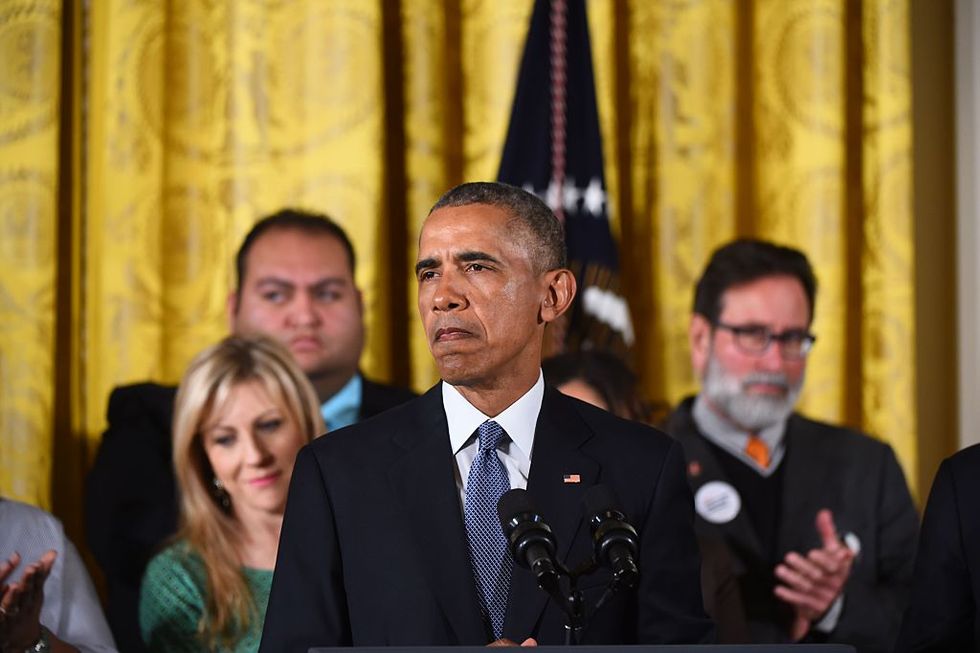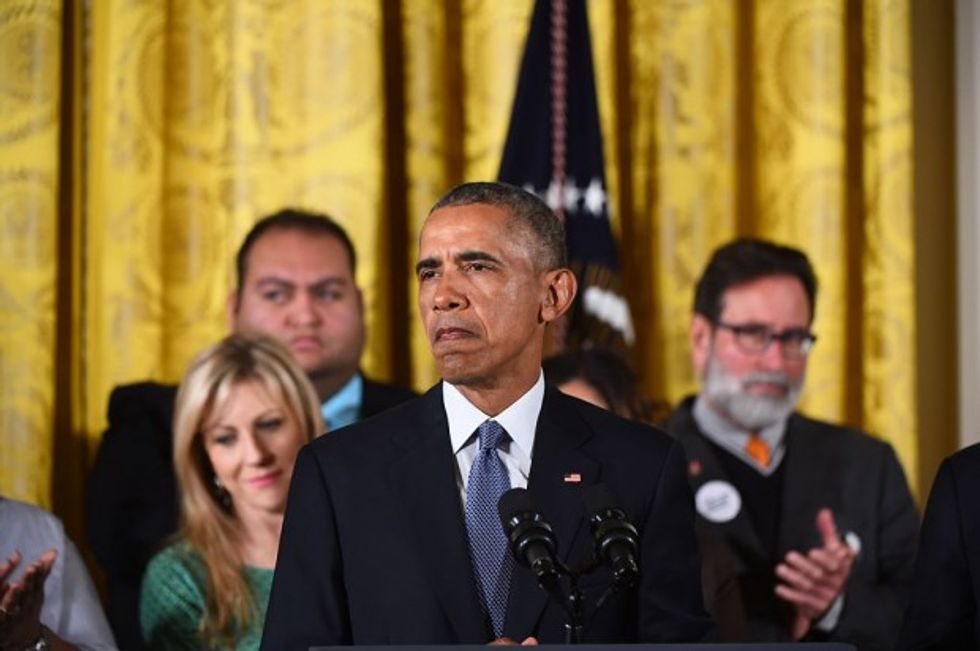
President Barack Obama gets emotional as he delivers a statement on executive actions to reduce gun violence, Jan. 5, 2016. (Getty Images/Jim Watson)

WASHINGTON (TheBlaze/AP) -- The new gun control measures announced by President Barack Obama on Tuesday would not have prevented many of the mass shooting during his two terms as president, including the slaughter of 20 first-graders in Newtown, Connecticut, in Dec. 2012.
Obama's executive action expands mandatory background checks to gun shows, flea markets and online sales, adds more than 230 examiners and staff to help process them and calls on states to submit accurate and updated criminal history data.

Those measures are seen as crucial to stemming gun suicides - the cause of two-thirds of gun deaths - by blocking immediate access to weapons. But, an Associated Press review shows, they would have had no impact in keeping weapons from the hands of suspects in several of the deadliest recent mass shootings that have spurred calls for tighter gun control.
The shooters at Sandy Hook and San Bernardino used weapons bought by others, shielding them from background checks. In other cases, the shooters legally bought guns.
In Aurora, Colorado, and at the Navy Yard in Washington, D.C., men undergoing mental health treatment were cleared to buy weapons because federal background checks looked to criminal histories and court-ordered commitments for signs of mental illness. The Obama administration is making changes in that realm by seeking to plug certain Social Security Administration data into the background check system and by helping states report more information about people barred from gun possession for mental health reasons.
The suspect in a shooting at a church in Charleston, South Carolina, should have been flagged at the time, but errors and delays cleared the way for his purchase.
Though the moves probably wouldn't have prevented recent mass shootings, Obama rejected the idea that undermines the changes.
"We maybe can't save everybody, but we could save some," Obama said.
Dec. 2, 2015, San Bernardino, California, 14 killed:
Syed Farook and his wife used weapons that the FBI says his neighbor, Enrique Marquez, purchased legally from a federally licensed dealer in 2011 and 2012. Marquez, now facing conspiracy and other charges, told investigators that Farook asked him to purchase the weapons because he would draw less attention. At the time, the FBI says, the men were plotting to shoot up a community college and a highway.
---
Oct. 1, 2015, Roseburg, Oregon, 10 killed:
Christopher Harper-Mercer and his family members legally purchased the handguns and rifle he used in the Umpqua Community College shooting from a federally licensed gun dealer, according to the Bureau of Alcohol, Tobacco, Firearms and Explosives.
---
July 16, 2015, Chattanooga, Tennessee, 5 killed:
The FBI says some of the weapons Muhammad Youssef Abdulazeez used in his attack on a pair of military facilities were purchased legally and some were not. It is unclear when the purchases were made and whether he was subject to a background check. Relatives say Abdulazeez had a history of mental illness, made a series of overseas trips and was arrested in April on suspicion of driving under the influence of alcohol. In May 2013, he failed a background check for an engineering job at a nuclear power plant in Ohio.
---
June 17, 2015, Charleston, South Carolina, 9 killed:
A February drug arrest should have prevented Dylann Roof from purchasing the pistol authorities say he used at Emanuel AME Church, but a record-keeping error and background check delay allowed the transaction to go through. The FBI says a background check examiner never saw the arrest report because the wrong arresting agency was listed in state criminal history records. After three days passed, the gun dealer was legally permitted to complete the transaction.
---
Sept. 16, 2013, Washington, D.C., 12 killed:
Aaron Alexis, a former reservist turned civilian contractor, passed state and federal background checks and legally purchased the pump-action shotgun used in the Washington Navy Yard shooting despite a history of violent outbursts and recent mental health treatment. Alexis was accused of firing a gun in anger in Texas in 2004 and Seattle in 2010, but was not prosecuted in either case. In 2011, he received an honorable discharge despite bouts of insubordination, disorderly conduct and unauthorized absences. None of that would have disqualified him from purchasing a weapon.
---
Dec. 14, 2012, Newtown, Connecticut, 26 killed:
Adam Lanza used his mother's weapons, including a .223-caliber semi-automatic rifle, in the massacre at Sandy Hook Elementary School. Investigators say Lanza's mother, whom he fatally shot before going to the school, also purchased the ammunition.
---
July 20, 2012, Aurora, Colorado, 12 killed:
James Holmes was receiving psychiatric treatment when he passed required federal background checks and legally purchased the weapons he used in the movie theater assault. As in the Navy Yard case, Holmes' treatment alone would not have disqualified his purchases. They would have been blocked if had he been adjudicated as a mental defective or committed to a mental institution.